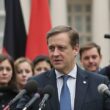The actor Matthias Brandt, youngest son of former German Chancellor Willy Brandt, has expressed a complex mixture of empathy and concern regarding his father’s historic 1970 kneeling gesture in Warsaw.
Speaking to “Der Spiegel”, Brandt acknowledged the profound significance of the act for the Federal Republic of Germany, recognizing that questioning it could be viewed as inappropriate. However, he shared a personal perspective, stating that observing photographs or film of the kneeling act causes him discomfort. “As a person observing my father, it pains me to see it” he remarked.
The gesture, performed on December 7, 1970, at the memorial for the victims of the Warsaw Ghetto Uprising, was explained by Chancellor Brandt at the time as an act of “atonement” for “a millionfold crime committed in the abused German name”. Matthias Brandt’s reflection centered on a sense of questioning, asking, “I find it difficult to watch, because I wonder why he chose to do that.
This year, Matthias Brandt will deliver the central speech at the commemoration marking the anniversary of the July 20, 1944, assassination attempt on Adolf Hitler. His parents, Willy and Rut Brandt, were themselves involved in resistance movements initially in Norway and later in Stockholm. Willy Brandt maintained contact with resistance groups within Germany and had fled the country in 1933.
“Of course, this experience shaped both him and me” Brandt told “Der Spiegel”. “I can’t imagine that his later political decisions weren’t influenced by it”. He emphasized the importance of remembering that a former refugee found himself in the position of leading the government, a reality that might be easily overlooked given the passage of time. “Especially now, I find it important to remember.
Brandt also stated his motivation for delivering the speech included a desire to counter the rise of the AfD party. He described a sense of societal paralysis attributed, in part, to unfamiliarity with confronting extremist forces. He contrasted this with his parents’ apparent directness and resilience in dealing with such challenges, portraying his father as possessing a seemingly fearless nature.





